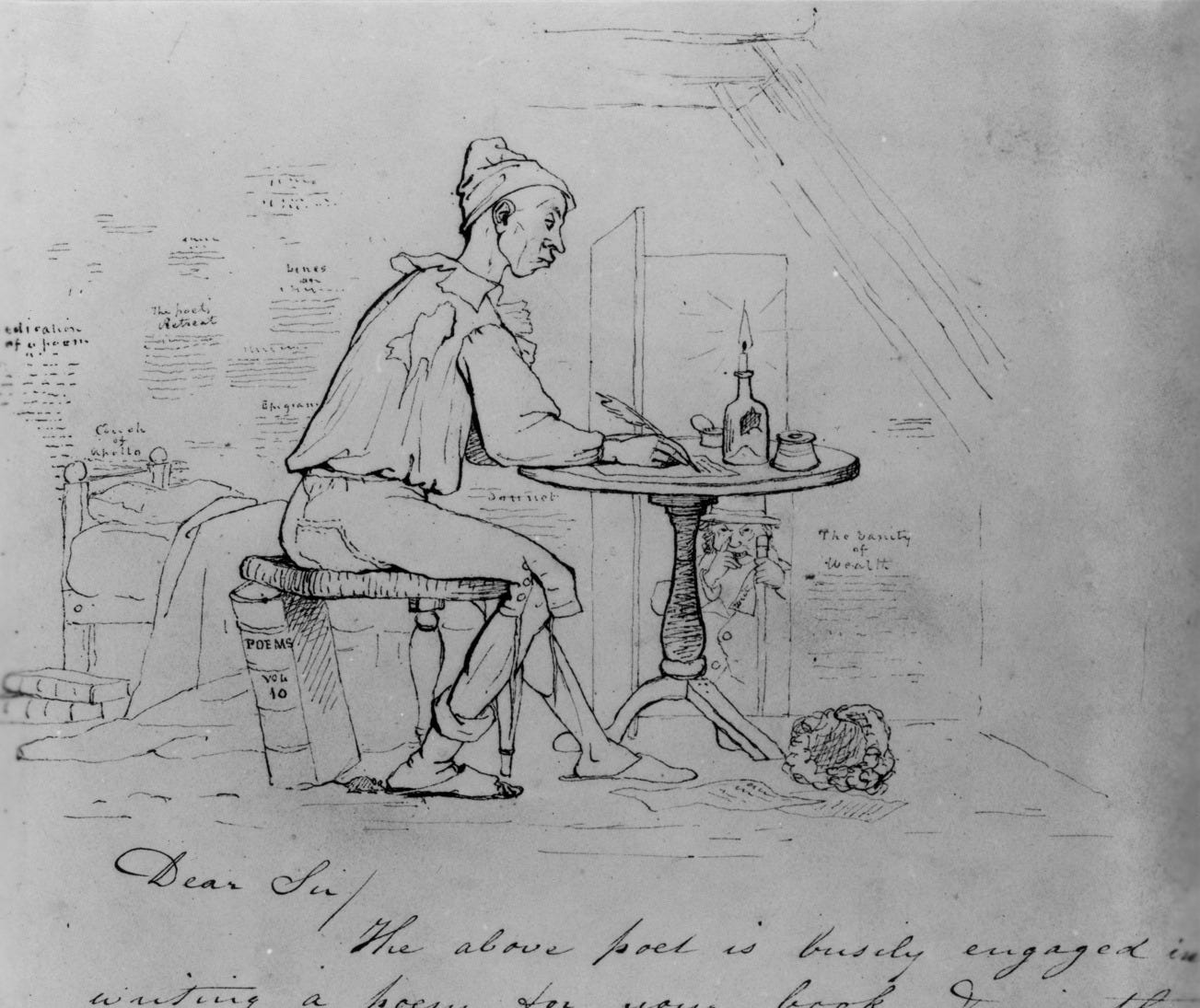Bread and Roses? Working as a Poet
When I was growing up the idea of being a writer – and even more so a poet – was very much a fantasy. My dad, being practical, suggested journalism instead. ‘I can just imagine it,’ one of my university friends used to say. ‘You as a poet, living in garret, wearing a shawl and lots of hair grips.’ In my mid-twenties, bored senseless by my data entry office job, I opted for teaching as a sensible, practical, reliable source of income. But school and FE college teaching is, I realised, extremely time-consuming these days. There was little time or brain space left for writing. Since then, I’ve negotiated a juggling of time and resources familiar to many people working in the arts – especially those producing work whose value can’t be quantified in terms of sales.

Poetry sales are booming, according to the Nielsen book data. Between 2013 and 2023 sales of poetry books in the UK rose from just under 8m to 14.4m. The reality is, though, that most of these sales relate to a small number of ‘instapoetry’ books whose authors leverage their huge social media followings. Most poetry books will make a few hundred pounds in royalties, and many poetry publishers wouldn’t survive without Arts Council funding.
There’s an idea in the UK that poetry should be something we do and give for free and for pure enjoyment, or as a promotional opportunity. Perhaps this is because the line between ‘hobby’ and ‘job’ can be blurred and shifting in poetry, and because judgements about the work’s intrinsic value can be tricky. I wonder, too, whether the idea of poetry as a free and freely given resource unsullied by concerns about money is linked to oral and bardic traditions of poetry as rooted in and serving community. But, particularly in a time of government austerity and rising living costs, this model of poetry production isn’t sustainable for most.
I wonder whether the idea of poetry as a free and freely given resource unsullied by concerns about money is linked to oral and bardic traditions of poetry as rooted in and serving community.
According to the Author’s Licencing and Collecting Service (ALCS), the number of full-time authors in the UK has more than halved since 2006. The median amount authors earn from their work dropped from £12,330 in 2006 to £7,000 in 2022. For authors in general, the gender pay gap is increasing and racial inequality remains entrenched – although there have been some huge and hard-won advances in diversity in UK poetry publishing over the past few years.
The digital marketplace tends to undervalue or devalue creative labour and favour a small number of commercially successful writers. Publishing advances are becoming rarer. This difficult marketplace means that writers are increasingly building ‘portfolio’ careers and relying on a range of income sources – a practice that’s already very familiar to most poets.
So, how do poets manage? As I argued in an earlier post on finding time to write, poetry can be written in snatched time: after the kids have gone to bed, in your head on the bus… As working-class poet Fran Lock argues, for many writers quiet sustained reflection is neither possible for necessary: ‘I think that for many of us, poetry erupts in the midst of precarity and scarcity, in the jaws of unlovable labour. It is the perfect mode of production for those poor in time and in resources; it travels light, communicates in fragments and flashes, requires no specialist equipment or training…’
In terms of paid work, academia has, in the past, provided a supportive space for poets to grow and thrive as part of broader learning communities. This is still the case at some institutions, but Higher Education in the UK is facing a huge economic crisis leading to decreased staff numbers, increased workloads, and regular rounds of redundancies. Poets tend to find work in education, arts charities and NGOs, publishing, journalism, copywriting, advertising, and performance, and might supplement this income with commissions, residencies and grants (from Arts Council England, for example, or the Society of Authors).
At a recent discussion on Living and Working as a Poet for Dialect at Gloucester Poetry festival we discussed Ireland’s pilot Basic Income for the Arts scheme. What would it mean if artists’ and writers’ basic economic needs were guaranteed to be met over a 3-year period? I think a scheme like this would provide a secure base from which poets could explore and develop in more innovative and creative ways, rather than working to more preconceived project deadlines or taking on excessive amounts of non poetry-related paid work for fear of scarcity. I’m reminded of the artists, musicians and writers whose intense periods of discovery and development were made possible by going ‘on the dole’ in the second half of the twentieth century.
What would it mean if artists’ and writers’ basic economic needs like bills and rent were guaranteed to be met over a 3-year period?
I love my teaching, mentoring and editing work. I’m a very social being and all this interaction informs and inspires my writing. It’s also true, I think, that a certain amount of pressure and constraint can be a good thing. Without deadlines and time pressures I might not write at all.
But the idea of scarcity as generative constraint has clear limits. The ‘starving artist’ cliché – and the idea of suffering as a necessary condition for artistic genius – is a Romantic construct that is, at best, unhelpful. There’s nothing romantic or cool about genuine poverty, or about crushed or unfulfilled potential. If we want our poetry to be genuinely representative and diverse, and to fulfil all its possibilities and potentials as an art form, then we have to begin to address the complex issues around education, income, and access to careers in the arts.
For more support with your writing life, find out about my teaching, mentoring and developmental editing or get in touch at poet@katepotts.net.





Brilliant post Kate - thanks for sharing these thoughts. It feels like such an impossible dream to have UBI in this country but am buoyed by efforts - particularly on the part of many good souls local to us in Stroud - and live in hope!